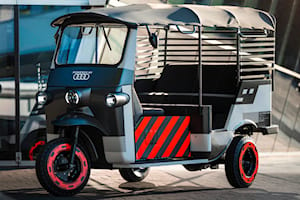Your next trip to the Taj Mahal could be powered by Vorsprung Durch Technik.
Audi fans will be aware of the carmaker's various eco-friendly ventures. Aside from creating gorgeous EVs such as the Audi RS e-tron GT, the four-ringed brand has pledged to only sell electric vehicles by 2026. It's a good start, but a truly sustainable future can only be achieved once upcycling and recycling become more commonplace in the automotive industry.
On that front, the automaker is already ahead of the curve. Together with Nunam, a German-Indian start-up, Audi will power electric rickshaws that will be used on Indian roads. These silent three-wheelers will glean motivation from used batteries that once powered the Audi e-tron test fleet. Aside from the various benefits (which we'll address shortly), the project hopes to explore how used modules can be repurposed for a second-life case use.
"The old batteries are still extremely powerful...when used appropriately, second-life batteries can have a huge impact," commented Nunam co-founder, Prodip Chatterjee.
The e-rickshaw, expected to hit Indian roads in 2023, is the ideal candidate for this project. As Chatterjee explains, EV batteries are designed to last for the lifespan of the vehicle. But, even then, there's still plenty of potential to be extracted. "For vehicles with lower range and power requirements, as well as lower overall weight, they are extremely promising. In this way, we're trying to find out how much power the batteries can still provide in this demanding use case," he adds.
Rickshaws often cover short distances at low speeds, so don't require high levels of energy to move about crowded streets. Chatterjee admits the idea of a battery-powered rickshaw isn't new; examples equipped with lead-acid batteries are a common sight but have a downside - these have a short lifespan and are not always disposed of appropriately. What's more, these lead-acid rickshaws draw power from India's power grid, which is heavily coal-reliant.
Nunam's solution is simple: solar panels, located on the roofs of the dispatch premises. At night, the three-wheelers can park up and charge using clean energy. In sunny India, an idea such as this is a no-brainer. Remarkably, Nunam has even planned for a third battery life. Once the battery no longer serves the needs of the e-rickshaw, it could be used for other applications such as LED lighting. "We want to get everything possible out of each battery before recycling."
Aside from the environmental benefits, this idea has the potential to reduce India's oft-criticized dependence on coal and, eventually, reduce India's high exhaust emissions (the third-highest after China and the United States). These particular e-rickshaws will be pressed into duty through a non-profit organization.
Fledgling businesswomen will be able to make use of the battery-powered tykes, transporting their products to the market and back. This will "[help] people in challenging life situations earn an income and gain economic independence - everything in a sustainable way," remarked Chatterjee.
Over in Germany, Audi has tasked trainees at its Neckarsulm site with developing a show e-rickshaw, pictured here. "The trainees and Nunam are in constant communication with each other. In building the show rickshaw, our trainees are focusing on range, charging time, and design - the result is a rickshaw with Audi's DNA...at the same time, we impart fundamental knowledge in the development of electromobility, resource efficiency, and charging technologies," said Audi's Timo Engler.
Elsewhere, the luxury car brand has applied a similar strategy with its new charging hub concept. Audi e-tron owners simply roll up to designated charging points (all of which are equipped with luxurious appurtenances) and charge their plush EVs via a clever energy storage system. Here, the power is also stored in recycled lithium-ion batteries.
BMW's close rival is also looking into the viability of using recycled glass in future EVs, in an attempt to make them more sustainable. We applaud Audi's approach to sustainability. Not only are they looking to reduce waste, but better lives too.









Join The Discussion